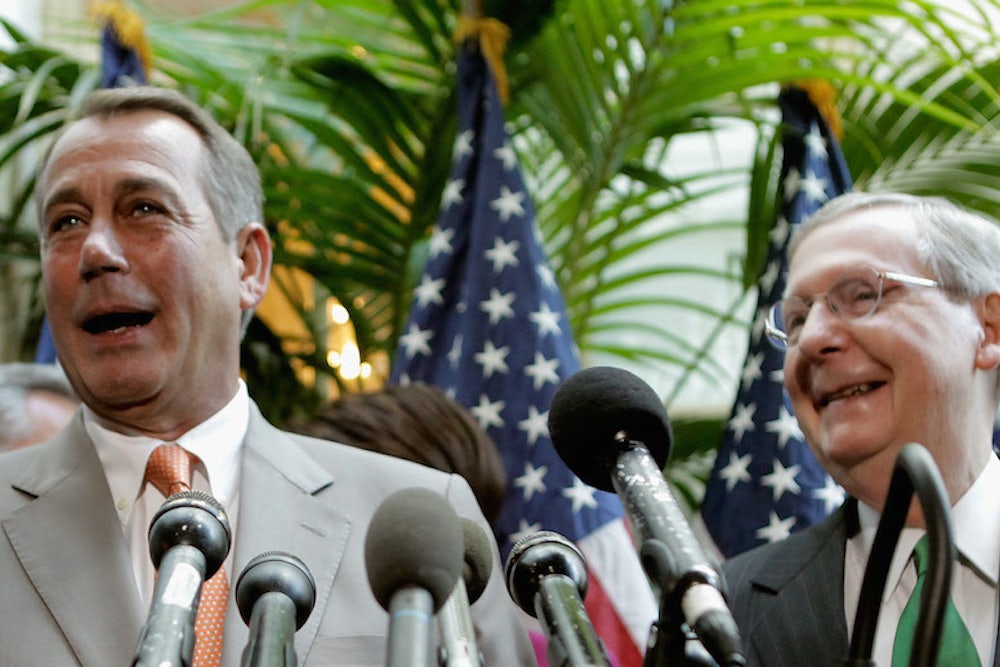Conservatives have reacted to Barack Obama’s executive action on immigration exactly as expected, bestowing an array of new titles on the president: tyrant, monarch, king, and so on. But name-calling may only be the beginning of it. Republicans are weighing whether to use a government funding bill to block Obama’s action. It’s looking increasingly clear that they will—and that an ensuing government shutdown could last a long time.
Republicans have pushed so many "scandals"—Benghazi, IRS, Fast and Furious, Solyndra—that it's difficult to know when their anger is real and when it's manufactured for political purposes. In this latest case, though, the fury is very real. The editorial board of National Review, for instance, has gone from imploring Republicans to be "a responsible party … just as the conventional wisdom has it" a few weeks ago to arguing that “House Republicans should consider a bill to fund the government except for Citizenship and Immigration Services (CIS), the agency in the Department of Homeland Security responsible for implementing the president’s order, and perhaps a few other selected portions of the administration.”
It’s not exactly clear if this would work, since the deferred action program is self-funded through user fees. But there’s no doubt that once the Republican Congress begins in January, it will have tools to use a government funding bill to block Obama’s action (by attaching a policy rider that blocks implementation of the executive action). If Obama vetoed a funding bill with such a rider, it would set up another government shutdown fight.
Reports currently indicate that soon-to-be Senate Majority Leader Mitch McConnell and House Speaker John Boehner don’t want that fight. The 2013 shutdown was a political disaster for Republicans. The Republican leadership doesn’t want to risk squandering any momentum they earned from the midterms. But as evidenced by the National Review editorial, much of the party is yearning—and feels a responsibility to initiate—that fight.
If that happens, it’s hard to predict how such a fight would end. In 2013, it was always clear that Republicans would have to give in eventually because their position was untenable and their demands unrealistic. But there are three reasons that a government shutdown fight in 2015 could last a long time:
A diminished backlash
In 2013, the political backlash was so strong and the initial strategy so foolish that moderate Republicans demanded their leaders give in. The politics of a new shutdown fight would be much murkier. Polls show the public split on Obama’s executive action; it’s not clear Republicans would take the blame for another government shutdown. At the very least, the blame likely won’t be as strong, putting less pressure on Republican moderates to compromise.
It’s also unclear how damaging a shutdown is to both parties’ politics in the long run. After the 2013 shutdown, Republican favorability rebounded quickly and they had a near-perfect showing in the midterms. Many Republicans—and Democrats—will look at that as a sign that a shutdown fight in early 2015 won’t hurt them in the 2016 presidential elections.
No debt ceiling deadline
The debt ceiling deadline, which was 17 days after the shutdown began, also provided a drop-dead date for the GOP. McConnell and Boehner understood that under no circumstance could the United States breach the debt limit. In other words, the shutdown fight had an expiration date. This time, the debt ceiling doesn’t need to be lifted until late summer. That doesn’t put much pressure on lawmakers to act.
Neither party will give in
Republicans will see their actions as a defense of the constitution, one they cannot relinquish under any circumstance. Obama will see his action as legal, justified, and one of his greatest domestic policy achievements. He won’t give that up lightly. Unless the backlash overwhelms either party, policymakers may decide that it is worth the political damage in pursuit of a larger goal.
None of this means a long shutdown, or a shutdown at all, will happen. GOP leaders and business groups are still opposed to the idea. But if they do choose to use the funding bill to push back against Obama’s executive action, the government could be closed for quite a while.
